Russia is negotiating with the Houthis of Yemen to protect Russian oil cargoes moving through the Red Sea for delivery to India and China, the principal destinations of Russian oil currently traversing the waterway, the Bab el-Mandeb Strait, and the Gulf of Aden.
Notified in advance to the Yemeni authorities and the Houthi military command, the Russian oil movements by tankers flying a variety of ship registry and national flags, are running the gauntlet of U.S. and European Union (EU) sanctions against Russian oil exports.
China is also negotiating with the Houthis for safe passage and protection of Chinese-flagged container vessels. The Chinese military base in Djibouti, recently reinforced to support a large Chinese military group intended for a United Nations peacekeeping mission in South Sudan, is also covering the waterway.
Both Moscow and Beijing are acting in semi-secret against U.S. and EU government threats to assemble a naval fleet to convoy shipping headed to and from Israel’s southern port of Eilat. This plan, which the Pentagon is calling Operation Prosperity Guardian, follows the failure of the two U.S. aircraft carrier groups in the Mediterranean, the Red Sea, and the Persian Gulf to protect Israel, and deter the Houthi operations. The Pentagon is also threatening to attack Yemeni territory.
The fleet, to be assembled over the next month from the Ukraine war coalition states against Russia, will also threaten military force against the movement of Russian oil.
Responding to direct questions about the new Red Sea threats on Wednesday afternoon, the Russian Foreign Ministry spokesman, Maria Zakharova, skirted saying what the Russian Security Council and General Staff have decided by asking the rhetorical question:
What will the U.S. presence there bring to the region? Greater stability, security, crisis resolution? Or will it all end, as always, with the opposite results?
Asked to be more specific, Zakharova said:
I have already commented on this question today. I just want to add to what has been said that any presence must have its own purpose and its own result. We see how the United States has increased its presence in the whole region: in the form of attacks on countries, aggression against sovereign regional states, interference in internal affairs, in the form of color revolutions, arms supplies, and manipulation of conflicts in the region. We see what all this has led to… The terrible crisis that has been unfolding before our eyes since October 7 this year. There is no prospect of its immediate completion or even de-escalation. Now everything is balancing on the level of whether, God forbid, this crisis will expand further. Everything is being done on our part to ensure that this does not happen.
Vzglyad, the semi-official security analysis publication in Moscow, has been pro-Israel since the Gaza war began. But yesterday it published a warning from sources identified as Russian experts on the region.
Yemen has already reacted to this statement. Representatives of the Houthis said that this coalition does not frighten them at all. That they have all the necessary capabilities to provide an adequate response to any actions directed against them and against Yemen. And this is not just a bluff, but words that have a real understanding of their resources and the capabilities behind them. In fact, the coalition ships which will be in the Red Sea will themselves be targets for Yemeni missiles (as the Houthis have already warned)… And the Americans are unlikely to risk conducting a ground operation against them. It is generally difficult to cope with any of the armed formations in Yemen, given the experience of the Yemeni militants and the terrain… The composition of the coalition has turned out to be quite specific. It did not include Egyptians and Jordanians suffering from Yemeni actions, nor the leaders of the region, the Saudis. There is not a single country in the Middle East except Bahrain. It turns out that none of them has wanted to defend their region, their sea and their interests from the Houthis, together with the Americans. Partly because they understand the futility of such an undertaking. Partly because they are afraid of a backlash from the Houthis. Partly because speaking out against the Houthis would mean, in this particular case, opposing their demands to de-blockade the Gaza Strip.
“No one needs this war—except, of course, the United States with its Western allies and Israel,” Vzglyad concluded.
“Tankers with Russian oil are not afraid of shelling by the Houthis,” is the headline in Wednesday’s Moscow business newspaper Kommersant.
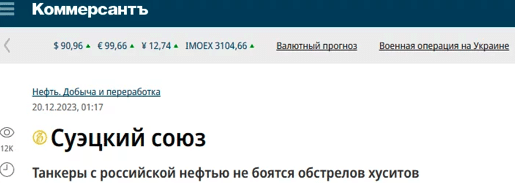
Source: https://www.kommersant.ru/doc/6412142
Citing vessel tracking data issued by the Kpler agency, the newspaper reports that “despite the fact that the largest European companies have suspended the transit of oil through the Red Sea due to the increased attacks by the Houthis, the largest Russian oil companies continue to actively transport raw materials along this route with the help of a shadow fleet. So, shortly after the attack on the Norwegian tanker on December 18, a cargo of Russian raw materials crossed the Bab el-Mandeb [“Gate of Grief” in English] Strait, and several more such cargoes are now actively following in this direction. In addition, a number of Russian tankers are already preparing to pass through the Suez Canal.”
Russian oil tankers continue their journey through the straits of the Red Sea after the Houthi attack on the Norwegian tanker Swan Atlantic. Despite the increased shelling by the Houthis, who carried out a series of attacks on container ships and tankers in the Red Sea in November and December, Russian tankers do not change their plans to pass through the Bab el-Mandeb Strait. So, a few hours after the Swan Atlantic was attacked by a UAV as a result of the Houthi attack on December 18, the tanker Butterfly-A with Rosneft oil heading to India overcame the danger zone, according to Kpler data. Now it crosses the Gulf of Aden, which washes the coast of Yemen from the south. According to Marine Traffic, there was also the tanker Fjord Seal in this area, which is carrying a shipment of Urals [crude oil] from Gazprom Neft to China.
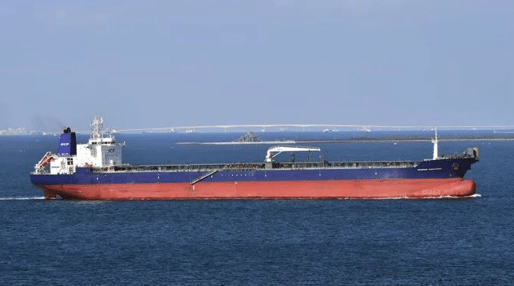
The Butterfly-A, Liberian-flagged, in the Gulf of Aden on December 19, according to Marine Traffic.

Left: The Fjord Seal, Panamanian-flagged, is currently in the Gulf of Aden, according to Marine Traffic. Right: the Fjord Seal at the Bab el-Mandeb Strait three days ago, according to Vessel Finder.
Also according to Kommersant,
due to the increased attacks by the Houthis, the largest Western container lines have suspended the transit of goods through the Suez Canal; as a result, carriers have to use a longer route bypassing the Suez Canal through the Cape of Good Hope. This leads to an increase in the cost of logistics and an increase in the delivery time of goods by several weeks. British BP has also announced the suspension of transit through the Red Sea on December 18, after which no European oil tankers remained on course to the Bab el-Mandeb Strait, except for ships with Russian oil.
Now, after passage through the Suez Canal, five tankers with Russian oil are crossing the Red Sea; they are due to pass through the Bab el-Mandeb Strait on December 20. Among them are the tankers Nanda Devi, Lefkada (both with Rosneft oil); Cauveri and Sea Hymn (carrying Surgutneftegaz oil); as well as the tanker Ocean Thunder with LUKOIL cargo from its Caspian Sea fields. These cargoes are being sent to India, which is the largest buyer of offshore shipments of Russian oil. In addition, two more tankers with Russian oil are approaching the Suez Canal from the Mediterranean Sea.
The Financial Times of London is reporting a western shipping panic. “Container shipowners increasingly abandoned one of the world’s busiest trading routes on Tuesday,” with vessel movement already down 36% by comparison with the same time a year ago.
Data compiled by MariTrace, a ship-tracking service, showed that as of Tuesday evening, only 210 ships were traversing the Red Sea, the route to and from the Suez Canal, one of the biggest changes in international trading routes since Russia’s full-scale invasion of Ukraine nearly two years ago. By comparison, there were about 330 vessels traversing the region last month.
The London newspaper, which is owned by the Japanese media group Nikkei and runs anti-China, anti-India, and anti-Russia propaganda, omitted to report there has been no change, route diversion, or attack on Russian, Chinese and Indian cargoes. Edited by a Lebanese, Roula Khalaf, the newspaper is also backing the Israeli attacks on Gaza, the West Bank, and Lebanon.
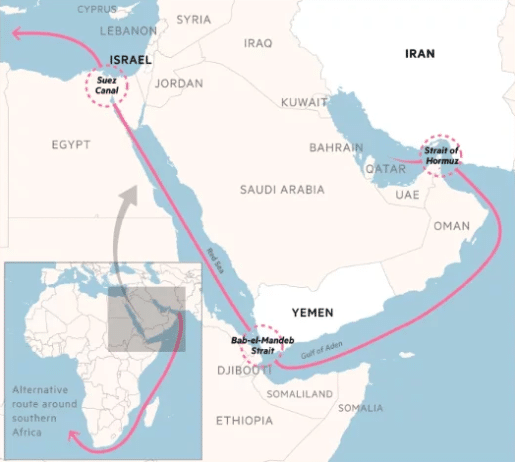
The attacks in the area risk disrupting global supply chains that depend on the Red Sea and the Suez Canal. The waterway accounts for 30 per cent of all container ship traffic and is a vital conduit for crude oil shipments… Retailers have also started warning of supply chain disruptions that could result from the vessel diversions… about 19,000 ships navigated through the Suez Canal each year, typically taking 30 to 40 days to complete an Asia-Europe voyage. Choosing this alternative route from Asia to Europe may extend the journey by three to four weeks.
Kommersant is reporting that “about 10% of global oil supplies pass through the Suez Canal. Over the past month shipments have declined markedly, as all European majors have suspended transit through the Red Sea… the Suez Canal and the Red Sea play a strategic role for Russia, because more than half of Russian oil exports by sea, or about 2 million barrels per day (b/d), including both Urals and Arctic grades, go through them. In addition to Russian companies, Iraqi and Libyan companies continue to transit oil through the Red Sea… The Russian Federation is the only major exporter west of Suez which has not seen a decrease in the activity of using the Red Sea: even in November-December, the transit of Russian oil remains at the level of 1.5 million b/d, decreasing only to the extent that Turkey increased its purchases of Russian oil.”
For the time being, Russian Foreign Ministry officials are keeping mum. In Marrakesh, Morocco, for a meeting on Wednesday (December 20) of the Arab-Russian Cooperation Forum, Foreign Minister Sergei Lavrov did not publicly mention the Houthis or the Russian contacts. He implied as much, however, in his press conference.
“We focused primarily on the Palestinian-Israeli conflict marked by an unprecedented escalation mainly in the Gaza Strip, but also in other places,” Lavrov said.
We reiterated our position that, while condemning any and all terrorist acts, we believe it is also unacceptable to respond to them by collectively punishing civilians and the indiscriminate use of force in violation of international humanitarian law… We discussed the situations in Syria, Libya, Yemen, Sudan, and other crises-ridden hotspots.
To date, there has been no Russian statement calling Houthi drone and missile operations against Israel or Israeli shipping in the Red Sea “terrorist acts”.
The Foreign Ministry communiqué summarizing the discussions in Morocco declared:
There was a thorough discussion of the situation in Syria, Libya, Yemen, Sudan, the Ukrainian crisis, countering terrorism and extremism, and the creation of a zone free of nuclear and other weapons of mass destruction in the Middle East.
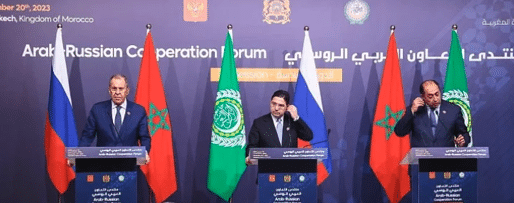
Left to right: Sergei Lavrov; Nasser Bourita, Moroccan Foreign Minister; Hossam Zaki, Assistant Secretary-General of the League of Arab States. (Source: https://mid.ru/en/)
Speaking in Moscow after Lavrov’s remarks, spokesman Zakharova was asked by reporters about the Houthi operations in the Red Sea and the U.S. threats.
Question: The Palestinian-Israeli conflict is growing. Now it has spread to the Red Sea, where the Yemeni Houthis are taking action against international shipping. The United States plans to conduct an operation there with ships of the participating countries of this plan. What, in Russia’s opinion, should be done to end this conflict and prevent it from expanding further in the region?
“A powerful question,” Zakharova acknowledged, but she avoided answering directly.
The main thing is really at the address. Do you know why? There is no sarcasm here. Our position is consistent. We do not change it based on market considerations. Indeed, we take into account both the realities on earth and the changes taking place, but at the same time we build our position on fundamental principles. What is this principle when I talk about the fundamental principles? These are the interests of the people inhabiting this region, the peaceful coexistence of peoples who, unfortunately, have been at war for a long time in their history and had big problems. Based on this, we proceed from the fact that the decisions (I mean the plan or the global roadmap) are contained in those very international legal documents, resolutions of the Security Council, the General Assembly, and decisions of relevant conferences… one country that is not part of this region, which for some reason constantly gives itself the functions of moderator and ‘regulator’ of the entire movement in international relations, prevents the de-escalation of the situation both in the short and long term. It should be understood (as Russian Foreign Minister Sergey Lavrov said) that it is necessary to develop additional diplomatic tools. As you know, the Quartet did not include the countries of the region. Of course, it is necessary to complement this new diplomatic toolkit with the presence of regional players. We need to do everything we agreed on. This is a two-State model with the peaceful existence of these two States, with the capital of the Palestinian State in East Jerusalem. Everything is available for this. Unfortunately, this is hampered by the presence of Washington’s political will to impose its vision of the development of the situation in the region.
A reporter asked Zakharova again:
How does Russia feel about the growing U.S. presence in the Red Sea? Does this have anything to do with President Vladimir Putin’s visit to Saudi Arabia and the Emirates?
She replied:
I have already commented on this question today. I just want to add to what has been said that any presence must have its own purpose and its own result. We see how the United States has increased its presence in the whole region: in the form of attacks on countries, aggression against sovereign regional states, interference in internal affairs, in the form of color revolutions, arms supplies, and manipulation of conflicts in the region. We see what all this has led to.
Over the past few decades, the increased U.S. presence in the region has never led to a way out of the crisis, but only to its aggravation. Each time, long-standing conflicts broke out with renewed vigour. We have seen the growth of the U.S. presence in the region in various directions: military, political, and financial. There were many plans: the use of hybrid schemes to get out of long-standing crises. Unfortunately, we see what all this has led to. The terrible crisis that has been unfolding before our eyes since October 7 this year. There is no prospect of its immediate completion or even de-escalation. Now everything is balancing on the level of whether, God forbid, this crisis will expand further. Everything is being done on our part to ensure that this does not happen. This issue should be treated from the point of view of goal setting. What will the U.S. presence there bring to the region? Greater stability, security, crisis resolution? Or will it all end, as always, with opposite results?
For the time being, western monitoring of Russian military movements have identified no Russian Navy vessels in the Red Sea or the Gulf of Aden, although the new Kilo-class submarine Ufa, assigned to the Pacific Fleet, is now in the Mediterranean, and expected to transit the Suez Canal into the Red Sea shortly. This Italian report of yesterday also identifies Russian surface ship movement westward across the Indian Ocean towards the Red Sea:
the tanker Kama, which is also transiting the Mediterranean but is likely heading towards the Red Sea. There, it is expected to provide logistical assistance to another Russian unit making its way from the Indian Ocean to the Horn of Africa.
Indian media are reporting the westward movement of Russian Pacific Fleet vessels in recent weeks, and a plan to establish a naval shore base on the Red Sea.
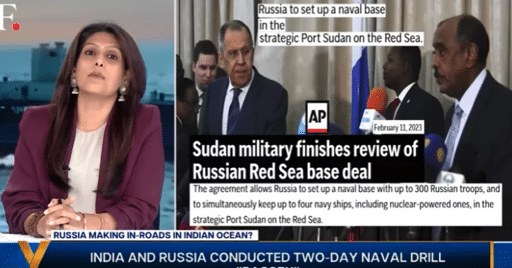
Source: https://www.youtube.com/
The Indian media are also monitoring the Chinese military base at Djibouti. In August 2022, satellite pictures of the base showed a Chinese Navy Type-071 landing assault vessel at berth. Subsequent satellite imagery for mid-July 2023, published by CNN, showed no warship in dock in Djibouti.
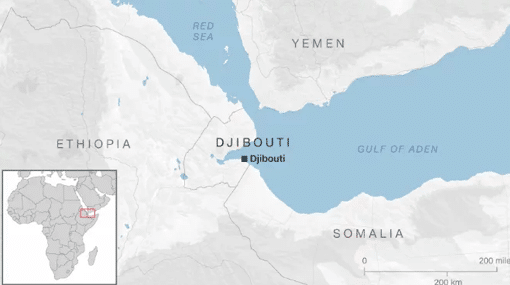
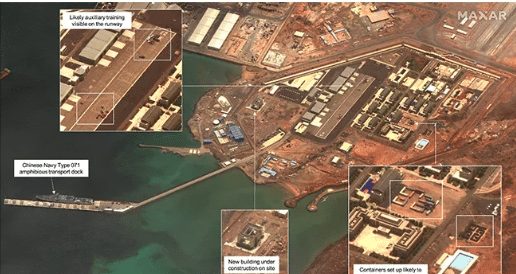
Chinese base at Djibouti, August 2022. Click for enlarged view at source.
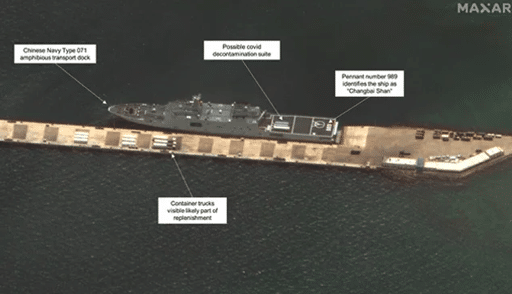
Close-up of Chinese Navy amphibious assault vessel at berth in Djibouti, August 2020.
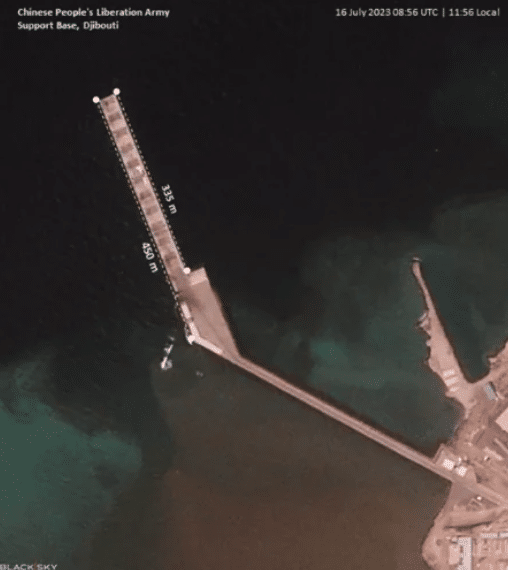
U.S. satellite image of July 16, 2023, berths empty. (Source: https://edition.cnn.com/)
The Chinese Navy’s deployment in the Persian Gulf in October and early November—reported here —appears to have ended, as the two-ship 44th Escort Task Force sailed east and made port in Myanmar. The guided-missile destroyer Zibo and guided-missile frigate Jingzhou had earlier held portcalls and sea drills in Kuwait, Abu Dhabi, and Oman. Before that, the task force had operated in the Gulf of Aden for anti-piracy escort operations over several months. It was then relieved in October by the 45th Escort Task Force. Comprising the Type-052 destroyer, the Urumqi; the Type-547 frigate Linyi and supply ship Dongpinghu, the Chinese naval group was escorting a fleet of Chinese deep-sea fishing trawlers at the Bab el-Mandeb Strait on October 22; the current whereabouts of the warship group has not been reported in the open press.
On November 18 the Linyi was operating with a Pakistan Navy frigate in “the first-ever joint patrol in waters around major maritime routes and port channels in the northern Arabian Sea.” The larger fleet drill with Pakistani vessels concluded on November 18. The two navies called their drill Sea Guardian.

